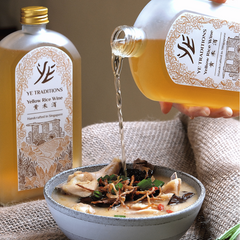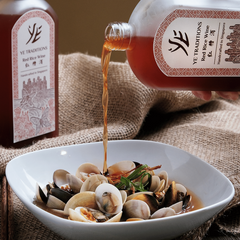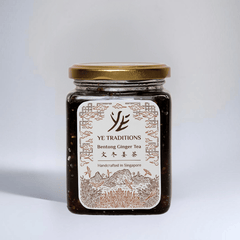How Rice Wine Changes Over Time?
Rice wine is much more than a culinary ingredient or beverage—it's a living product that evolves over time, developing richer flavors and complex aromas as it ages. Many of you do reach out to us and ask about the changes in your rice wine's colours as time goes by. Just like fine wine, the aging process can significantly enhance the qualities of rice wine, making it a unique experience for the palate. In this article, we’ll explore the art of aging rice wine, what changes to expect, and how to enjoy it at its best.
What Happens When Rice Wine Ages?
When rice wine ages, several chemical reactions occur that affect its taste, aroma, and colour:
-
Flavour Development:
Over time, the flavors in rice wine become more pronounced and layered. Freshly crafted rice wine, like our Red Rice Wine or Yellow Rice Wine, might have a crisp and slightly sweet taste. However, when aged, these wines can develop deeper, nuttier, or even earthy undertones as the proteins and amino acids break down to create new flavor compounds. -
Color Transformation:
The color of rice wine can change dramatically with age. For example, our Red Rice Wine starts with a beautiful crimson hue, while our Yellow Rice Wine has a cool golden color. Over time, these colors can deepen to rich shades of amber or mahogany due to oxidation and the natural caramelization of sugars. -
Aroma Evolution:
The aroma of rice wine also evolves, becoming more complex and layered. Young rice wines may have fruity or floral notes, while aged wines can acquire hints of toasted nuts, dried fruits, or spices, providing a more intriguing olfactory experience.
Why Age Matters (to Some People) in Rice Wine
We all have different palates, and some people prefer aged rice wines while some dislike the strong, sometimes perceived as acidic taste that comes from aged rice wines. Given that we have many articles that talk about the benefits of rice wine in cooking, here are some key reasons why some people enjoy aged rice wines:
-
Enhances Complexity:
With time, rice wine develops a broader spectrum of flavors and aromas, offering a more refined and mature taste. There are people who really enjoy this taste, and we've found that these are people who have been drinking a lot of rice wine and are more used to the bolder and stronger taste. -
Softens Harsh Edges:
Aging allows rice wine to mellow, reducing any sharp or overly pungent notes, resulting in a smoother, more balanced profile. Thankfully, Ye Traditions rice wines are already smooth tasting all because of our proprietary formula, but there are definitely brands out there that use the aging process to mask the sharp notes that the wine inherently has. -
Increases Market Value:
Just like vintage wines, aged rice wines are often considered more valuable and sought after. But we also find it a waste if you find yourself with a bottle of aged wine and dislike it, so you can try to age your rice wines at home!

Why Age Rice Wines At Home?
At Ye Traditions, we believe in providing our customers with the most versatile rice wine possible. While aged rice wine has its own appeal, we understand that not everyone enjoys the deeper, sometimes more intense flavors that come with age. Also, as mentioned earlier, it can be more pricey so why commit to something when you can do at home easily? Here’s why we leave the aging process to you:
-
Personal Preference:
Aging rice wine, including our Red Rice Wine and Yellow Rice Wine, can lead to a wide range of flavors—from sweet and mellow to nutty and robust. We recognize that every palate is different, and by selling fresh rice wine, we give you the freedom to decide how you want to enjoy it at every stage of the rice wine's shelf life. -
Control Your Experience:
By purchasing our small batch rice wine, you have full control over how and where to age it, ensuring that you can create the perfect taste experience tailored to your liking. -
Optimal Freshness and Quality:
Our rice wines, including the popular Red Rice Wine and Yellow Rice Wine, are crafted using traditional methods to offer a balanced and fresh flavor right from the start. Enjoy them immediately for a lighter, crisper profile, or choose to age them yourself for a richer, more complex experience.
How to Age Rice Wine Properly
If you’re interested in aging rice wine at home, consider the following tips:
-
Storage Conditions:
Store rice wine in a cool, dark place away from direct sunlight. Consistent temperatures and minimal exposure to air are key to preventing oxidation and preserving the wine’s quality. -
Use Proper Containers:
If storing rice wine for an extended period, ensure it is sealed in airtight containers. Traditionally, ceramic or glass bottles are ideal for maintaining the integrity of the wine during aging. Our bottles are already glass, so you can continue using it to age. -
Patience is Key:
Allow the wine to age undisturbed. Depending on the variety, rice wine can age anywhere from a few years to several decades. The longer it ages, the more complex the flavors will become.
Enjoying Aged Rice Wine
Aged rice wine, including aged versions of our Red Rice Wine and Yellow Rice Wine, can be enjoyed in several ways:
-
Sipping:
Savor aged rice wine on its own to fully appreciate the depth and complexity of its flavors and aromas. Serve it at room temperature or slightly warmed to enhance its bouquet. -
Cooking:
Aged rice wine adds a rich, savory note to dishes like braised meats, stews, and stir-fries, imparting a unique flavor that fresh rice wine cannot replicate. -
Pairing with Food:
Pair aged rice wine with robust flavors such as soy-based dishes, roasted meats, or rich, umami-packed foods to complement its complexity.
Discover Your Perfect Rice Wine Experience with Ye Traditions
At Ye Traditions, we offer high-quality, freshly brewed rice wines like our Red Rice Wine and Yellow Rice Wine to suit any preference. Whether you want to enjoy our rice wine immediately for its light and crisp taste or age it yourself to explore deeper flavors, we’ve got you covered.
Explore our collection today and take control of your own unique rice wine journey. And if you're looking for tips on selecting the best rice wine, don’t miss our guide on How to Choose the Best Rice Wine.







Leave a comment